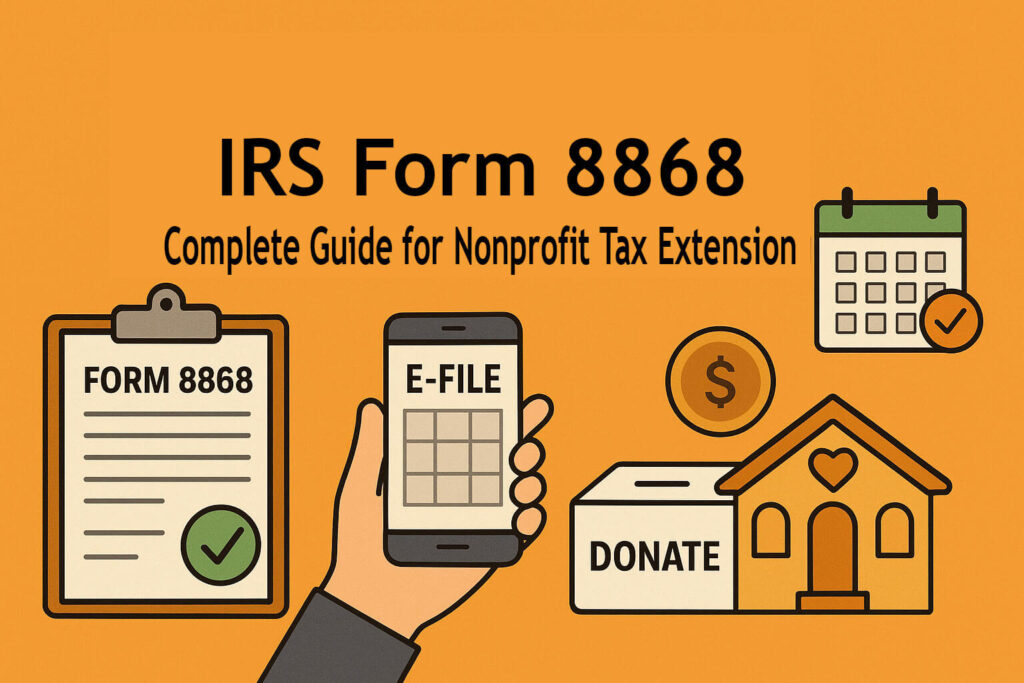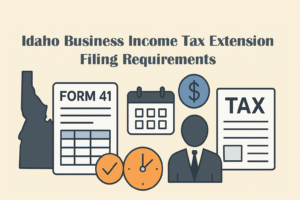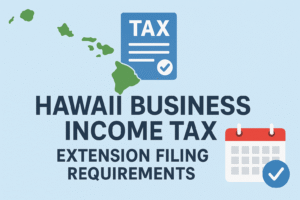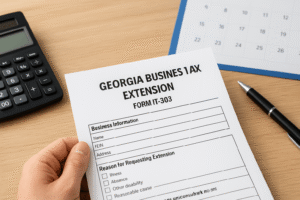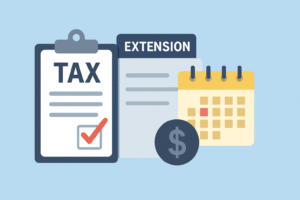Nonprofit organizations play an essential role in serving communities, but just like businesses, they must comply with IRS filing deadlines. Sometimes, nonprofits may need more time to file their annual information return. This is where IRS Form 8868, Application for Extension of Time to File an Exempt Organization Return, comes into play.
Form 8868 allows eligible tax-exempt organizations to request additional time to file their information returns without facing late-filing penalties. Understanding how this extension works, who should file, deadlines, penalties, and filing instructions is crucial for nonprofit organizations to stay compliant.
What is Form 8868?
Form 8868 is an IRS extension form specifically for tax-exempt organizations, including charities, social clubs, labor unions, educational institutions, and other nonprofits. By filing this form, an exempt organization can request a 6-month automatic extension to file its annual return (such as Form 990, 990-EZ, or 990-PF).
It’s important to note that Form 8868 only extends the time to file a return, not the time to pay any taxes due. If your nonprofit owes unrelated business income tax (UBIT), the tax payment must still be made by the original due date.
Who Must File Form 8868?
Form 8868 is used by tax-exempt and nonprofit organizations that are unable to file their annual information returns on time. This includes:
- Charitable organizations (501(c)(3))
- Social clubs (501(c)(7))
- Trade associations and business leagues (501(c)(6))
- Private foundations required to file Form 990-PF
- Employee benefit associations or plans
- Nonprofit schools, hospitals, and research institutions
If your nonprofit is required to file Forms 990, 990-EZ, 990-PF, 4720, or related forms and cannot meet the original deadline, you must submit Form 8868 to request an extension.
What Forms Can Be Extended Using Form 8868?
Form 8868 can be used to extend the due date for the following IRS nonprofit tax returns:
Forms That Can Be Extended Using Form 8868
Nonprofit organizations and certain trusts can use Form 8868 to request a 6-month automatic extension for the following information and excise tax returns:
- Form 990 or Form 990-EZ – Return of Organization Exempt from Income Tax
- Form 990-PF – Return of Private Foundation
- Form 990-T – Exempt Organization Business Income Tax Return
- (sec. 401(a) or 408(a) trust)
- (trust other than above)
- (corporation)
- (governmental entities)
- Form 4720 (individual) – Return of Certain Excise Taxes on Charities and Other Persons
- Form 4720 (other than individual) – Same form, but filed by organizations or disqualified persons
- Form 1041-A – U.S. Information Return Trust Accumulation of Charitable Amounts
- Form 5227 – Split-Interest Trust Information Return
- Form 6069 – Return of Excise Tax on Excess Contributions to Black Lung Benefit Trust
- Form 8870 – Information Return for Transfers Associated With Certain Personal Benefit Contracts
- Form 5330 (individual) – Return of Excise Taxes Related to Employee Benefit Plans
- Form 5330 (other than individual) – Filed by organizations for the same excise tax purposes
Note: While Form 8868 provides an automatic 6-month extension for filing, it does not extend the time to pay taxes. Any balance due with Forms 990-T, 4720, or 5330 must be paid by the original due date to avoid penalties and interest.
These forms are often detailed and require significant recordkeeping, which is why the IRS allows exempt organizations extra time when needed.
When is the Due Date to File Form 8868?
The due date for filing Form 8868 is the same as the original due date of the return you are trying to extend.
| Deadline | Applicable Forms |
| Forms that are due by April 15, 2026 | Form 990-T (sec. 401(a) or 408(a) trust)Form 1041 A |
| Forms that are due by May 15, 2026 | Form 990Form 990 PFForm 4720Form 5227Form 6069Form 887Form 990-T (trusts other than sec. 401(a) or 408(a))Form 990-EZForm 990 BLForm 990-T (corporation)Form 4720 (individual) |
- For organizations with a calendar tax year (ending December 31), the due date is May 15 of the following year.
- For organizations with a fiscal tax year, the due date is the 15th day of the 5th month after the fiscal year ends.
Example: If your fiscal year ends on June 30, 2026, your Form 990 would be due November 15, 2026. Filing Form 8868 by that date would extend your due date to May 15, 2026.
What Information is Required to Complete Nonprofit Tax Extension Form 8868?
To properly complete Form 8868, you will need the following details:
- Organization’s legal name and address
- Employer Identification Number (EIN)
- Type of return you want to extend (990, 990-EZ, 990-PF, etc.)
- Fiscal year beginning and ending dates
- Contact information of the responsible officer
- An estimate of any tax due (if applicable)
- Payment method details if submitting balance due
Having this information ready before filing ensures accuracy and reduces the risk of rejection.
How to Complete Form 8868? Line by Line Instructions
Part I – Identification
- Enter the organization’s name, address, and EIN.
Part II – Return Information
- Check the box for the return you are requesting an extension for (e.g., Form 990 or 990-PF).
Part III – Filing Period
- Provide the beginning and ending dates of the tax year.
Part IV – Payment Information
- Enter any balance due that must be paid by the original deadline. Remember, the extension does not cover tax payments.
Signature
- The form must be signed by an authorized officer or fiduciary of the organization.
How to File Form 8868 With the IRS?
There are two ways to file Form 8868:
- E-file – The IRS strongly encourages exempt organizations to file Form 8868 electronically. E-filing provides instant confirmation, faster processing, and reduces errors.
- Paper filing – Although less common today, you may mail a paper Form 8868 to the IRS. However, e-filing is safer and more reliable.
Where to Mail Extension Form 8868?
If filing Form 8868 by paper, send it to the following address:
Department of the Treasury
Internal Revenue Service Center
Ogden, UT 84201-0045
What Are the Penalties for Not Filing Form 8868?
Failing to file Form 8868 or the original return by the due date may lead to severe penalties:
- Late Filing Penalty – $20 per day, up to $12,000 for smaller organizations, or $110 per day for larger organizations.
- Loss of Tax-Exempt Status – Continued failure to file for 3 consecutive years may result in automatic revocation of exempt status.
- Interest and Penalties on Tax Due – If Form 990-T or 4720 requires payment, late payment interest applies.
Timely filing Form 8868 helps organizations avoid unnecessary financial and compliance issues.
FAQs About Form 8868
Q1. How do I know if my extension was accepted?
If you e-file, you will receive an electronic confirmation from the IRS. Paper filers should wait for acknowledgment by mail.
Q2. Do I need to provide a reason for applying for a Form 8868 extension?
No. The IRS grants an automatic 6-month extension upon request. No explanation is required.
Q3. Can I apply for an extension after the deadline?
No. Form 8868 must be filed on or before the original due date of your return. Late extension requests will be rejected.
Q4. Does the extension also apply to tax payments?
No. The extension applies only to filing your return, not to tax payments. Any tax due must be paid by the original deadline.
Q5. Can I pay my balance tax due while filing Form 8868?
Yes. You can pay electronically using IRS Direct Pay, EFTPS, or credit/debit card payments while filing Form 8868.
Q6. What are all the payment options to pay balance tax due?
- Electronic Federal Tax Payment System (EFTPS)
- IRS Direct Pay (bank account)
- Debit or credit card via IRS-authorized providers
- Check or money order (if paper filing)
Q7. What type of rejection occurs in Form 8868?
Rejections usually happen if:
- Incorrect EIN or organization name
- Wrong fiscal year dates
- Duplicate extension requests
- Late submissions
Q8. What is the difference between Form 7004 and Form 8868?
- Form 7004 – Used by businesses to extend time for corporate, partnership, and trust returns.
- Form 8868 – Used only by tax-exempt organizations for extending annual information returns.
Q9. What is the perfection period?
The perfection period is the short time (generally 10 days) given by the IRS to correct errors or provide missing information after a rejection. If corrected within this timeframe, the filing is treated as timely.

